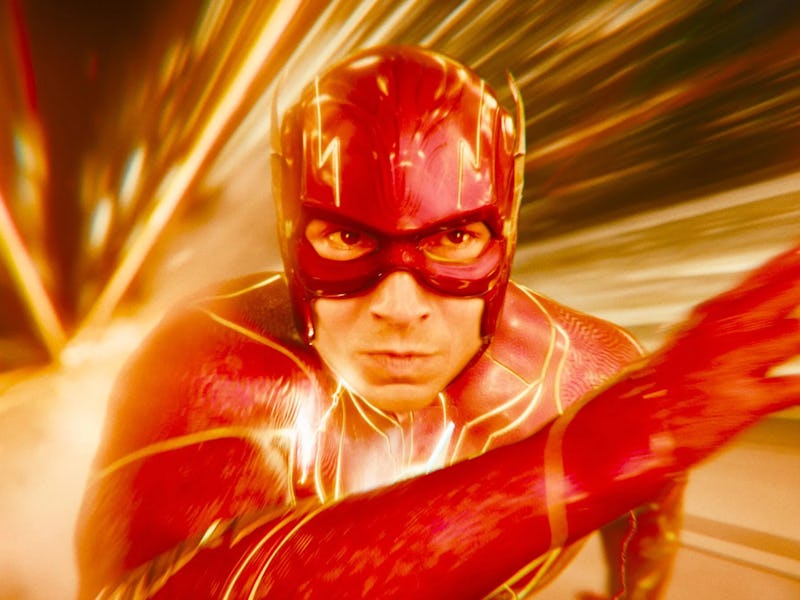How The Flash Brings the DCEU to an End
It may not be a victory lap, but The Flash certainly tries to celebrate what’s come before it.

It’s no secret at this point that the DCEU’s long-unraveling Snyderverse is coming to an end. With James Gunn and Peter Safran hard at work on building their new era of the DC Universe, it’s felt for many months now like The Flash and Aquaman and the Lost Kingdom are destined to be the final efforts of a team that has already been disbanded behind the scenes.
It shouldn’t come as much of a surprise then that The Flash not only celebrates many of the DC films and TV shows that have come before it, some of which were directed by Zack Snyder himself. But the film also opens the door for it and all of its fellow Snyderverse properties to be left behind. The film even goes so far as to end on a moment that, for all intents and purposes, erases one of the Snyderverse’s key figures from existence.
Spoilers for The Flash follow!
What happens at the end of The Flash?
The Flash speeds toward an ending that feels like the legitimate end of an era.
In The Flash’s third act, Barry Allen (Ezra Miller), his younger self, and an evil, older version of the latter are forced to watch as multiple different realities begin to crash into each other. Through a series of quick cuts, The Flash reveals that these “realities” are actually the worlds of Warner Bros.’ numerous past DC franchises, including the Christopher Reeve-led Superman films, Adam West’s Batman TV series, and even the Nicolas Cage-starring Superman movie that was never made.
Faced with the fallout of his time-traveling decisions earlier in the film, Barry realizes that he has to let his mother die in order to save not just his reality, but every reality. However, while he goes back and shares one final goodbye with his mother, Barry also decides to try and ensure his father’s future freedom. In its second-to-last scene, The Flash then follows Barry as he arrives at his father’s appeal case just in time to see him finally be exonerated.
While his decision to secure his father’s release from prison doesn’t have any major effects on his reality, either, Barry discovers in The Flash’s final scene that the Bruce Wayne he once knew, who was played by Ben Affleck, no longer exists in his universe. Instead, he finds himself face-to-face with a version of Bruce who’s played by Batman & Robin star George Clooney. Later, in The Flash’s only post-credits scene, Barry explains to a very drunk Arthur Curry (Jason Momoa) that, unlike their multiversal variants, every alternate version of Bruce Wayne looks different from the other.
The Snyderverse is just one of many DC worlds
The days of the Snyderverse are nearly over.
More than anything, George Clooney’s cameo at the end of The Flash feels like a playful wink on the part of the film’s makers to the audience. After all, now that everyone knows there probably won’t be a sequel to The Flash or many more movies set in the Snyderverse, why not have a little last-minute fun with the franchise’s canon?
By establishing that all of DC’s past film and TV franchises still exist separately in the same multiverse, The Flash also allows Warner Bros. to leave the Snyderverse behind. When Gunn and Safran inevitably reboot the DC Universe with Superman: Legacy and the other titles they’re currently developing, comic book fans can, therefore, rest easy knowing that the Snyderverse hasn’t just been erased. Instead, DC Films will have simply transitioned to a new reality, one that will hopefully be a bit more cohesive than the Snyderverse was ever given the chance to be.
Even if that’s not the fate some fans wanted for the Snyderverse, Warner Bros. needed a movie that could effectively close the chapter on the past 10 years of its DC Films division. The Flash, for its part, does that while also going out of its way to celebrate and pay homage to the Snyderverse’s complicated legacy.
The Flash introduces multiple new characters and possibilities while also saying goodbye to a few.
The Flash, notably, isn’t the last Snyderverse film that Warner Bros. is going to release. Aquaman and the Lost Kingdom, director James Wan’s sequel to 2018’s Aquaman, is also set to hit theaters this December. However, it’s unlikely that film will interact with the actual canon of the DCEU the same way The Flash does. Not only does the new film’s release coincide with the 10-year anniversary of Man of Steel, but it also incorporates elements of that Zack Snyder-directed blockbuster into its plot.
That aspect of the film, along with Ben Affleck, Gal Gadot, and Jason Momoa’s small roles in it, make The Flash feel like an exuberant conclusion to the Snyderverse. Although your enjoyment of it may vary, there’s no denying that the film certainly tries to send its ill-fated DC franchise out on an explosive, reality-altering note.